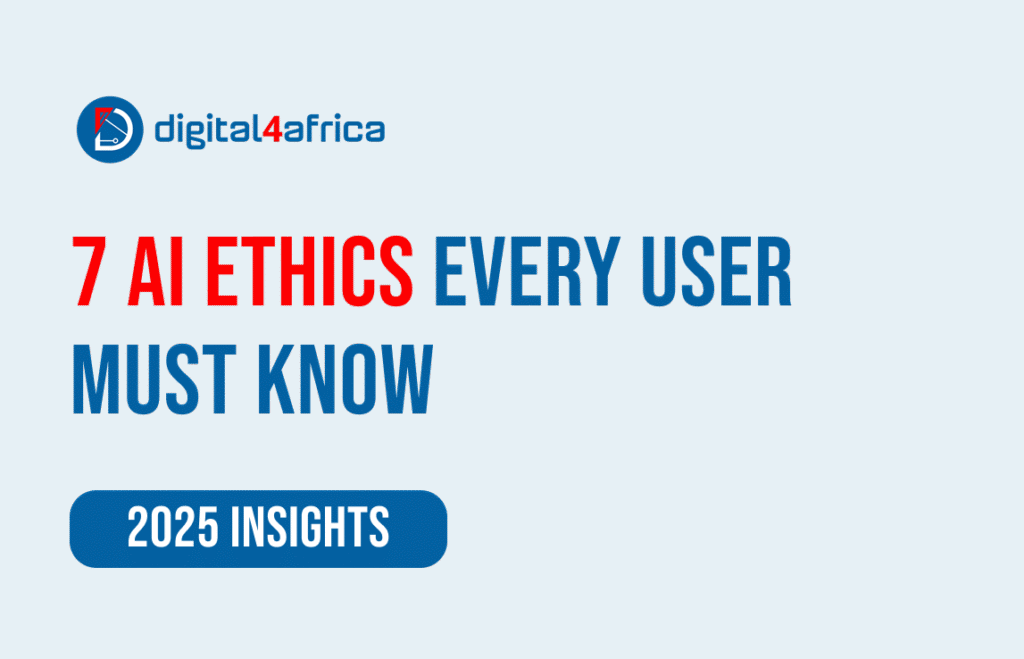7 AI Ethics Every User Must Know
7 AI Ethics Every User Must Know — curating your social media feed, suggesting movies, songs, and videos you may like on streaming platforms, and even helping doctors diagnose diseases. It’s no longer a distant future; it has become an integral part of our daily lives here in Africa. But with great power comes great responsibility. And that responsibility isn’t just for the engineers and tech giants building AI. It’s for you, the everyday user.
As AI becomes more common, understanding its underlying ethical principles is crucial for everyone, whether you’re a developer, a business owner, or just someone who uses AI daily. In this blog, we’ll discuss the 7 AI ethics every user must know.
1. Fairness and Bias Mitigation
AI systems should be designed and used in a way that ensures all individuals and groups are treated fairly, without discrimination based on race, gender, tribe, age, religion, or socioeconomic status. They shouldn’t amplify existing societal biases. Developing ethical AI requires diverse datasets and regular bias checks.
What you can do: Be aware that AI can inherit biases from its training data. If an AI-driven decision seems unfair, question it. If you notice AI treating people unfairly (eg, profiling), report it. If you’re building AI, test it with diverse datasets and closely monitor the outputs.
2. Transparency and Explainability
Have you ever been curious about the reasons behind an AI’s recommendation for a movie or its decision to reject your job application? Transparency means you should know when you’re interacting with AI and be able to understand how an AI system reached a particular decision or recommendation. For instance, if an AI denies your credit card application, you deserve an explanation in plain language, not just a black-box algorithm.
What you can do: When using AI tools, look for explanations of how they work. If an AI makes an important decision, ask for clarity on the criteria used. Opt for services that offer clear explanations for their AI-driven results. If you’re a developer, prioritize “explainable AI” models.
3. Accountability and Responsibility
There must be a definite human or organizational entity held responsible when an AI system makes an error or causes harm. For example, when a self-driving car causes an accident, someone must be accountable. Accountability ensures developers, companies, or users answer for AI’s actions. Without it, harm can go unchecked.
What you can do: Understand that AI systems are merely tools, and humans remain responsible for how they are used. If you experience harm from an AI system, seek out channels for redress. Support policies that establish clear lines of responsibility for AI failures. If you’re deploying AI, establish who handles errors. Ask: Who’s liable if this AI messes up?
4. Privacy and Data Protection
AI relies heavily on data, but that doesn’t mean it should invade your privacy. Smart devices like voice assistants can record conversations without clear consent. Maintaining privacy in AI involves collecting only the necessary data, securing it, and ensuring you provide informed consent.
What you can do: Read privacy policies of AI-powered apps, even if it’s just the summary. Be mindful of the permissions you grant apps.Recognize what information AI services are collecting from you and the reasons behind it. Exercise your right to access or delete your data whenever possible. Advocate for data minimization—ask yourself: Does this AI really need all my data?
5. Safety and Reliability
AI systems, particularly in critical applications like healthcare, must be developed to be robust, secure, and function reliably without causing harm. A poorly designed AI could misinterpret data, like a medical AI misdiagnosing a patient, or be vulnerable to hacks, like a smart home device. Ensuring safety involves rigorous testing and implementing strong security measures.
What you can do: Report any glitches or unusual behavior in AI systems. Advocate for strict safety standards and testing for AI applications, especially in high-risk areas. Opt for proven, reliable AI solutions where safety is paramount. If you’re a developer, focus on implementing security updates and conducting thorough stress tests on your AI.
6. Societal Impact and Benefit
AI should be developed and used to contribute positively to society, addressing issues like poverty, disease, and climate change, and promoting inclusive growth. The training of large AI models consumes massive energy, contributing to carbon emissions. Enhancing societal well-being means using AI to benefit communities and minimize negative effects, like reducing inequality or environmental damage.
What you can do: Support AI initiatives that prioritize sustainability and inclusivity. Advocate for energy-efficient AI and equitable access. Ask: Is this AI making the world better or worse?
7. Human Control and Autonomy
AI should empower, not replace, human decision-making. Humans should always remain in charge of AI systems, with the ability to intervene, override decisions, and ensure AI serves human goals, not the other way around. Human agency means AI supports us while we retain control.
What you can do: Be aware of when you are interacting with AI versus a human. Don’t blindly trust AI outputs; use your own judgment. Insist on having options for human oversight or appeal when AI makes important decisions affecting you.
Why This Matters
Artificial intelligence is more than just programming—it’s a tool that influences our lives. Overlooking ethical considerations can lead to biased decisions, violations of privacy, or societal harm. These seven ethical principles aren’t just theoretical concepts; they are practical guardrails for navigating the rapidly evolving world of AI, ensuring it works for us, not against us. By understanding them, you can use AI responsibly, hold developers accountable, and advocate for a future where AI serves everyone fairly.
Take Action
- Question AI Outputs: Don’t blindly trust AI. Verify its decisions and ask for explanations before accepting them.
- Advocate for Ethics: Encourage companies and developers to prioritize transparency, fairness, and privacy in their AI systems.
- Stay Informed: Follow AI ethics conversations on platforms like X or through organizations like UNESCO.
- Share Knowledge: Promote awareness of AI ethics among your friends, colleagues, or within your community.
AI is only as good as the people using it. Together, let’s make it a force for good. At Digital 4 Africa, our goal is to empower you with the insights needed to succeed in this digital age. Your informed choices today will shape the future of AI.
What’s one ethical action you’ll commit to regarding AI today?
By Jennifer Mutuku, Content Marketer, Digital4Africa.


